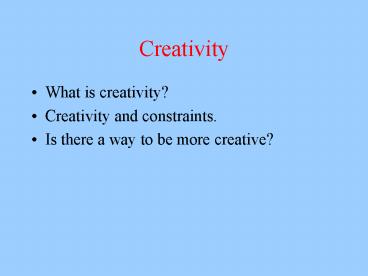Creativity - PowerPoint PPT Presentation
1 / 17
Title:
Creativity
Description:
Michael Jordan. Creativity and Cognition. Creativity involves generation of new ideas ... A new idea for a person. A person may come to a new realization ... – PowerPoint PPT presentation
Number of Views:41
Avg rating:3.0/5.0
Title: Creativity
1
Creativity
- What is creativity?
- Creativity and constraints.
- Is there a way to be more creative?
2
What is creativity?
- The problem with creativity is that we know it
when we see it, but it is hard to define.
Picasso Les Demoiselles DAvignon
3
Creative stuff
Frank Lloyd Wright
Charles Darwin
Michael Jordan
4
Creativity and Cognition
- Creativity involves generation of new ideas
- Boden
- p-creativity A new idea for a person
- A person may come to a new realization
- h-creativity A new idea historically
- Novel inventions are h-creative
- Most of what we think of as creative is an
example of h-creativity. - h-creativity can be studied historically
- You do not know when a creative event will happen
- p-creativity can be studied
5
H-creativity
- We saw the dangers of looking at h-creativity
when we talked about insight. - There are many myths that grow up around great
inventions. - The significance of inventions is not realized
until much later - Stories must be told in retrospect.
- People tend to dramatize the story.
- Most creative acts are rather mundane
- Invention is 99 perspiration and 1
inspiration. -Thomas Alva Edison
6
Incremental invention
- Sewing machines
Invented in 1848
7
Why is invention incremental?
- How can a creative idea come about?
- It must be related to existing ideas
- Otherwise, how would people think it up?
- How could it be implemented?
- What does it mean for an idea to be ahead of its
time? - A creative idea must be comprehensible to others
- What good is an invention that nobody wants?
- Suggests that existing ideas may constrain
creativity.
8
New inventions
- Innovative inventions are often based on known
products.
Early railroad cars were designed like
stagecoaches on tracks. Engineer and
brakeman were not moved inside until later.
Stagecoaches were a good solution to initial
problems Other problems were not discovered
until later.
9
P-creativity
- In order to understand creative invention better,
use college students. - The ideas may not be h-creative
- The same processes may be at work.
- Questions
- Are creative ideas influenced by existing
concepts? - What will make people more creative?
- How should creativity be judged?
10
Creativity and Concepts
- Draw an animal that does not exist.
- Ward
- Karmiloff-Smith
Novel animals have many properties of real
animals Often have bilateral symmery
Sense organs on head Similar sense
organs to humans.
11
Where do examples come from?
- People select common concepts as examples
- They seem to use specific items
- When asked to create novel intelligent beings
- Animals typically walk upright
- Animals typically have two arms and two legs
- People seem to be using humans as a basis.
- Effect not limited to college students.
Even sci-fi authors and movies seem to have the
same constraints.
12
What makes people more creative?
- A paradox
- People access categories when being creative
- Categories are retrieved on the basis of cues
during the creative process - The more cues available, the more access
- More specific situations lead to less creativity.
- Forcing people into strange situations can lead
to higher levels of creativity
13
An example
- Four conditions.
- Pick a category of invention and pick parts
- Parts assigned pick category
- Category assigned pick parts
- Both category and parts assigned
- Creativity of inventions increases as you move
down this list
14
Measuring creativity
- There is no objective measure of creativity
- Most studies just ask people to create something
and then have others rate it. - Poses a problem for studying creativity
- If we do not know what it is well enough to be
able to measure it, how can we study it?
15
Is creativity special?
- There are certainly exceptional people
- Are they doing something very different from what
normal people do? - Most current research suggests that the same
processes are at work. - Creative people may have good strategies for
exploring novel portions of creative space. - May be good at using analogies to bring knowledge
from one domain to another.
16
Summary
- H-creativity and p-creativity
- It is hard to study h-creativity
- Myths grow up around creative acts
- It is easier to study p-creativity
- May miss some aspects of highly creative
situations. - People are constrained by their knowledge
- We often create variations on known categories.
17
(No Transcript)































